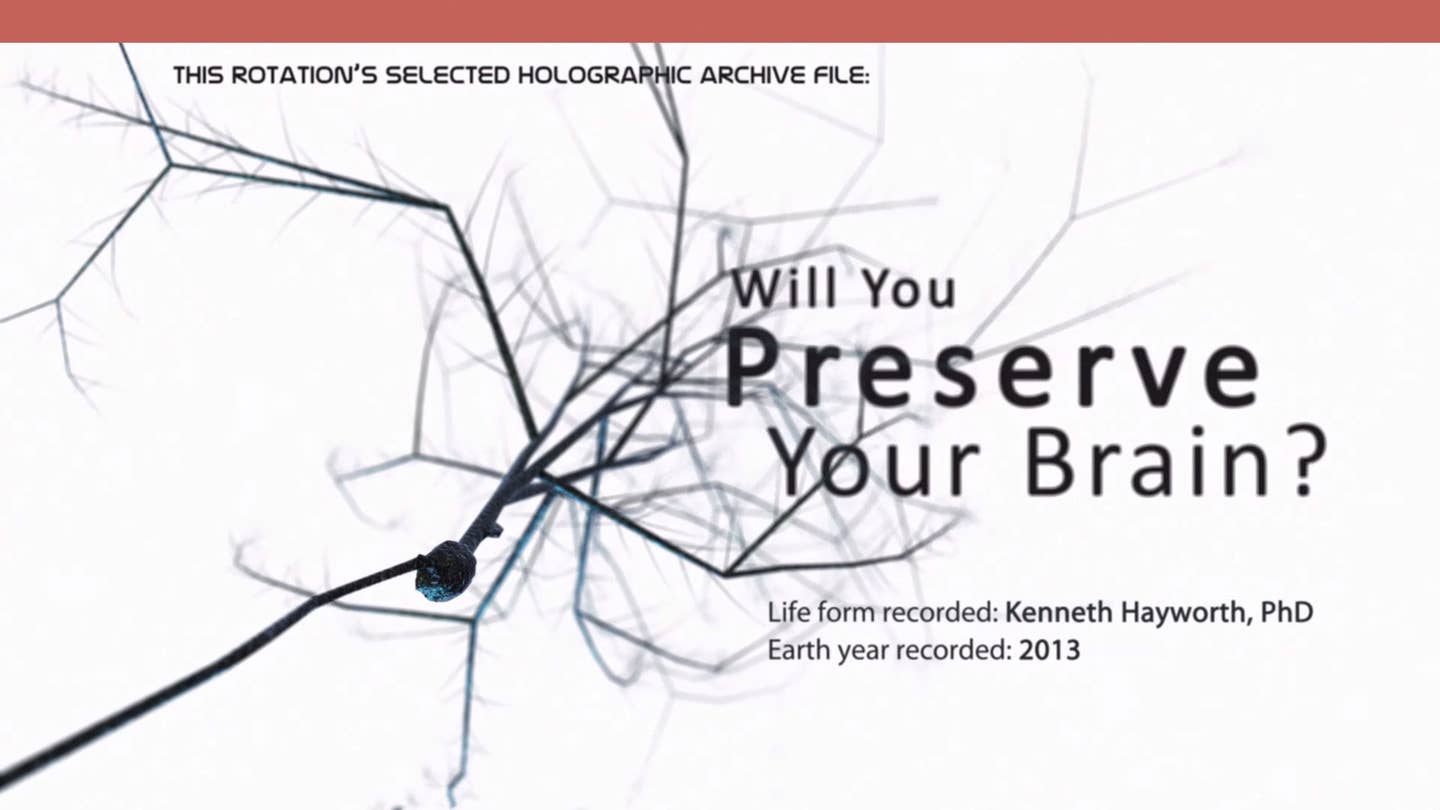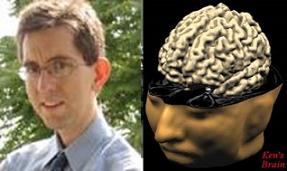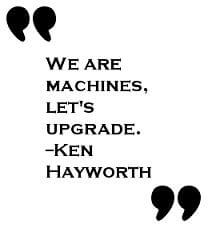Brain Preservation Technology Prize: A Proposal for Immortality?

Share

This is Ken Heyworth (left). This is his brain (right). Ken wants the right to chemically store his brain so he can be uploaded into a computer. And he wants the same for you.
Of all the paths we may take to longevity and immortality, Ken Hayworth's may strike you as the hardest to accept. This postdoctoral fellow at Harvard University has spent years developing techniques to scan the brain and record its synaptic circuits. Hayworth believes that we may all be able to see the future years from now, and then to essentially live forever. How? All you need to do is wait until the hours before your death and then allow someone to chemically preserve or freeze your brain, slice it into nanometer thin wafers, scan it, and upload your mind into a computer. Through his website, BrainPreservation.org, Hayworth is proposing the creation of a Brain Preservation Technology Prize; a way of generating the necessary scientific and technical developments necessary to bring his idea to fruition. With the right funding, Hayworth thinks the prize could lead to brain preservation technology being available in as little as five years. If the idea of having your brain sliced and then living as a software construct seems less than appealing, you're not alone. Yet Hayworth is adamant that not only is brain preservation possible, access to such technology is the inalienable right of every human being. You can hear his arguments for his cause in the videos below.
Most of the technology we've discussed in regards to longevity has been aimed at preserving the body you have now. Health supplements, better living, 24/7 monitoring - these things are aimed at maintaining your youth and vitality. Even more radical philosophies to aging, like those proposed by the Methuselah Foundation, are geared to keeping the current you alive for as long as possible. In some ways, Hayworth is rejecting that path towards longevity and immortality. Or, at the very least, he is pragmatically predicting that such options will not be available to people soon enough. Instead of finding someway to maintain your current body, or of preserving you in suspended animation, Hayworth proposes transferring your mind to a new form. Same you, just in a computer.
That idea may or may not be crazy, but it's one that's been bantered about many times before. As discussed in the movie Transcendent Man, Ray Kurzweil hopes to recreate a version of his dead father in a computer simulation. Kurzweil wants to use records and family memories, not scans of a brain, but the two proposals are similar enough otherwise. Henry Markram and the BlueBrain Project are aiming to create a full software simulation of a brain in the next ten years. They want to use it to run tests on neurological drugs and conditions, but a brain in a box is a brain in a box. If they can create a full simulation of one brain, they should be able to do it for others. So maybe you could be uploaded into a computer.
Would you want to be? It would be a radically different kind of life experience, but there are those among us who don't shy away from shedding humanity 1.0. Transhumanism (sometimes referred to as H+) is a movement to embrace and explore the transition of humanity from its current form into whatever form(s) it may evolve into next as technology allows. At a the H+ Summit in California this last December, Ken Heyworth presented his proposal for brain preservation. Unfortunately the audio quality on these clips is poor. For those who'd prefer to read Hayworth's speech, a complete transcript can be found here.
As Heyworth sees it, opposition to brain preservation technology centers on the "unique soul metaphor". To illustrate the USM, let's ask a question. If I made an exact copy of your brain (in a working human body), every synapses and molecule in its place, would it be you? Most people, I think, would say, "No. I am me! There is only one. I cannot be copied." Heyworth says, and cognitive science may agree, that such a point of view is uninformed at best. We may actually be the wiring of our brains. If we copied your wiring, we may have an exact other you. Rejection of that idea (which I must admit, for myself, comes from a very fundamental level in my psyche) is a belief in the USM. Of course, most of humanity doesn't have a problem with such a philosophy. Many religions are based upon it, and even many atheists don't wish to dismiss their uniqueness. For Heyworth, however, the USM is keeping us from believing in a real path towards the preservation of our lives. As makes sense from his point of view, Hayworth rails against the USM in his website, his essays, and his speech.
Let's pretend for a moment that mind uploading was an inevitable technology, that we're going to perfect it sometime in the future. Let's also pretend that we don't have a philosophical rejection of making digital copies of ourselves. Would brain preservation really make sense? Could it work?
Be Part of the Future
Sign up to receive top stories about groundbreaking technologies and visionary thinkers from SingularityHub.


Well, most people don't die from causes that destroy their brain. And while many people die from trauma related to unexpected accidents, not all of these are DOA to a hospital. In other words, there is time, in a majority of cases, to preserve one's brain before death. If you wanted to do so. Brain's preserved before death would carry the synaptic/chemical information necessary for a mind upload (again, assuming that such a technology would one day exist).
Hayworth believes that the science of brain preservation is near at hand. His site links to several peer review studies on the chemical and cryogenic storage of brain tissue. His personal inclination seems to be towards chemical storage as cryogenics have associated problems with damaging tissue. In any case, Hayworth himself is a scientist looking to scan and analyze the brain. It's reasonable to assume that he knows the parameters necessary for preserving the organ so that it can one day be uploaded.
I find Hayworth's entire proposal fascinating, but I have no way of knowing if it will ever bear fruit. Prize systems do seem to work, but they need money. The Brain Preservation Technology Prize is just an idea at this point, it's not even close to being funded. Hayworth can advocate the technology, he can create a Mind Uploading Bill of Rights, he can draw up well articulated proposals, but without the support of financiers, or funding for relevant research, nothing will get done. Which, I guess, is where the Transhumanism movement comes in. If enough people start to believe in transitioning humanity into other forms, Hayworth's proposal may find the support to work.
If it does, it will be an interesting new world. Imagine every hospital equipped to preserve your brain if you dip too near to death. Imagine having to decide (with a living will?) if you'd want your brain to be chemically stored like those from the Bodies Exhibit. And imagine that day, ten, twenty, or a hundred years from now when mind uploading technology came online. Thousands of brains sliced and scanned, ready to form a new digital population of formerly dead individuals. Sometimes the possibilities of science seem too extraordinary to believe. It could happen though.
[image credit: Ken Hayworth]
[source: BrainPreservation.org, H+ Summit]
Related Articles

Hugging Face Says AI Models With Reasoning Use 30x More Energy on Average

Study: AI Chatbots Choose Friends Just Like Humans Do

AI Companies Are Betting Billions on AI Scaling Laws. Will Their Wager Pay Off?
What we’re reading
